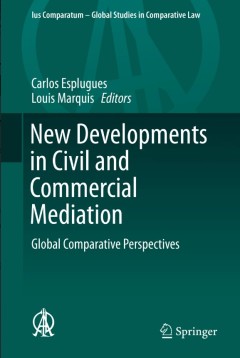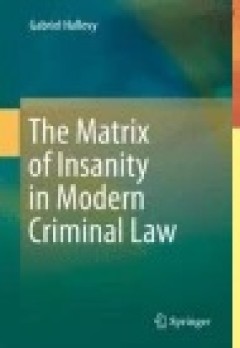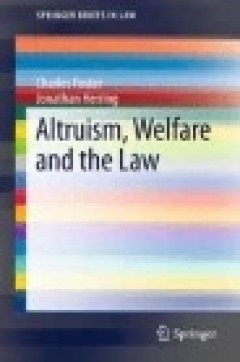Filter by

New Developments in Civil and Commercial Mediation:Global Comparative Perspec…
By means of the analysis of more than 20 national jurisdictions of different legal and geographical origin this book provides a general understanding of the developments that civil and commercial mediation is currently undertaking across the world. The book combines 25 national reports with a General Report analyzing the major trends in civil and commercial mediation worldwide. A number of the …
- Edition
- 1
- ISBN/ISSN
- 978-3-319-18134-9
- Collation
- XXXII, 762
- Series Title
- Lus Comparatum - Global Studies in Comparative Law
- Call Number
- -
Discrimination at Work : Comparing European, French, and American Law
How do the United States and France differ in laws and attitudes concerning discrimination at work? Franco-American scholar Marie Mercat-Bruns interviews prominent legal scholars to demonstrate how these two post-industrial democracies have adopted divergent strategies. Whereas employers in the United States and France rarely discriminate openly, deep systemic discrimination exists in both coun…
- Edition
- -
- ISBN/ISSN
- 9780520959583
- Collation
- -
- Series Title
- -
- Call Number
- 344 MER d
Land Use
This text explores the laws governing the use of land. Sometimes narrowly focused, often intensely local, land use regulation may give the impression of a highly specialized field with small stakes. The text is divided into three parts: First, we will survey the ordinary, local administrative scheme of land use regulation. The cases in this section are intended to establish what that syst…
- Edition
- -
- ISBN/ISSN
- -
- Collation
- -
- Series Title
- -
- Call Number
- 340 TUR l
Law of Wills
The purpose of this casebook is to train law students to think and act like probate attorneys. This book is meant to be used in conjunction with the author's book on the law of trusts. This book's focus is problem-solving and legal application; the book includes numerous problems, so law students can learn to apply the law they learn from reading the cases. It also contains collaborative learni…
- Edition
- -
- ISBN/ISSN
- -
- Collation
- -
- Series Title
- -
- Call Number
- 340 LEW l
Evidence : Rape Shield Rule
The Rape Shield Rule, contained in Federal Rule of Evidence 412 and state counterparts is a Rule preventing the admission of evidence concerning the sexual predisposition and behavior of an alleged victim of sexual misconduct, subject to certain exceptions. Through a series of cases and hypotheticals drawn from actual cases, this chapter gives readers a roadmap for how to address any Rape Shiel…
- Edition
- -
- ISBN/ISSN
- -
- Collation
- -
- Series Title
- -
- Call Number
- 340 MIL e
Law for Entrepreneurs
Law for Entrepreneurs is an up-to-date textbook that covers the broad spectrum of legal issues that entrepreneurs must understand when starting and running a business. The text is organized to permit instructors to tailor the materials to their particular approach. The authors take special care to engage students by relating law to everyday events with their clear, concise and readable style. …
- Edition
- -
- ISBN/ISSN
- 9781453344170
- Collation
- -
- Series Title
- -
- Call Number
- 340 MAY l
The Law of Trusts
The use of testamentary trusts is becoming an important part of estate planning. As a result, students who want to make a living as probate attorneys will need to know how trusts fit into estate planning. In addition, bar examiners realize that it is important for students to have a basic knowledge of trust law. That realization will result in bar examination questions that test that knowledge.…
- Edition
- -
- ISBN/ISSN
- -
- Collation
- -
- Series Title
- -
- Call Number
- 340 LEW l
Ethics of Tax Lawyering
In order to appreciate the ethical complications in which tax lawyers often find themselves, it is essential to appreciate and understand the greater contexts of legal ethics and the tax system. While it is important to begin with this more general discussion of ethics and tax lawyers, it may also be useful to re-read this section after finishing this chapter – to get a view of the forest af…
- Edition
- -
- ISBN/ISSN
- -
- Collation
- -
- Series Title
- -
- Call Number
- 340 HAT e

The Matrix of Insanity in Modern Criminal Law
The book covers the following aspects: the structure of the principle of fault in modern criminal law, the development of the insanity defense in criminal law, tangential in personam defenses in criminal law and their implications for insanity and the legal mechanism of reproduction of fault.
- Edition
- -
- ISBN/ISSN
- 978-3-319-20597-7
- Collation
- XIII, 204
- Series Title
- -
- Call Number
- -

Altruism, Welfare and the Law
This book is an assault on the notion that it is empirically accurate and legally and philosophically satisfactory to see humans as atomistic entities. It contends that our welfare is inextricably entangled with that of others, and accordingly law and ethics, in determining our best interests, should recognise the central importance of relationality, the performance of obligations, and (even ap…
- Edition
- Ed. 1
- ISBN/ISSN
- 978-3-319-21605-8
- Collation
- IX, 82
- Series Title
- SpringerBriefs in Law
- Call Number
- 340.1 FOS a
 Computer Science, Information & General Works
Computer Science, Information & General Works  Philosophy & Psychology
Philosophy & Psychology  Religion
Religion  Social Sciences
Social Sciences  Language
Language  Pure Science
Pure Science  Applied Sciences
Applied Sciences  Art & Recreation
Art & Recreation  Literature
Literature  History & Geography
History & Geography